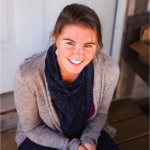A guest post by Shannon Griesser
Sustainability is buzzword that is used quite often in the social impact world. But what does it really mean? I sat down with Seri and Freedom Story Sustainability Director Worn Donchai to get his perspective about what sustainability means and how it fits in with our work on Seri.
How do you define sustainability?
For me, it is the way that people choose to live their life, in a way that is good for themselves, their family, and their environment. It is a give and take that is balanced – it is healthy for them and for the environment. Sustainability is a good relationship in the long term between humans and the environment.
Why do you feel it’s important to be working on the Sustainability Project at The Freedom Story?
This is important because for many families in the village, there is no balance between the way to get income and the way they are living. So people may choose the short term way to get income that is harmful for themselves, choose the wrong job because they need money, which might mean human trafficking. They don’t think about the harmful affect to their lives or their family. So the sustainability project helps shows people that there are other ways to live healthy and earn income, just from nature.
And sustainability is not just living with nature- there are ways to live sustainably in both the city and the village. It’s about balance. So people in the village and the city, they all need to know how to get income and survive and also keep the community and environment healthy.
Since the Sustainability Project was launched in 2013, how have you seen the sustainability project impact the community?
First, we have helped the villagers learn about using material and resources in the village to benefit or get income. Like Eri silk worms – people use a cassava or tapioca leaves leftover from the field to feed the worms, then you benefit from the worm by using the worm pupa, which high protein as food, a silk cocoon for make a textile or yarn and a silk waste for your fertilizer. People are excited – they are learning that the things they already have, they can use in other ways. Before this, they didn’t know that they can produce something new from leftovers. The families that are involved with the Eri silk programs, they keep continuing with it because now it is a part of their lives. They love it, they are happy and they are continuing to do it.
In the beginning of the sustainability project, I invited a lot of people to learn about the silk worms, but only a few followed through. Those people have continued with the silk worms and now their neighbors and other people in the village have become interested. Now, I am not reaching out to them because they are coming to me, asking me to teach workshops and help them learn more sustainable practices.
“They need to continue to practice what we are teaching them so that it will sustain in the long term and they can do it by themselves without our help. It takes time, but it is happening.”
In every workshop, we want to change the way their minds think so that they can live more sustainably in the future. Like last week, I showed about 20 women from the village how to make laundry detergent and fabric softener using natural materials, so they don’t have to buy from the store or use harmful chemicals. And we don’t just tell them information as a hand out. If they want to take part in the learning then they need to share in the process. They need to continue to practice what we are teaching them so that it will sustain in the long term and they can do it by themselves without our help. It takes time, but it is happening.
What is your dream for Seri as a part of the Sustainability Project?
One thing I see for people in our village and community is that they have skills to produce things, but a lack of knowledge around business and marketing. I hope that Seri becomes a channel for them to share their skills and products with a wider market, because they would not be able to do that on their own. Then they continue to do what they love, with the silk worms or sewing or weaving, and we can take them to the global market.
Down the line, I want the community members to be able learn about the marketing and business process so that they can invest in Seri to become a partner in the success. If they gain more skills then they will take more ownership, and Seri can be a social business that is successful in both the Western and Asian markets. Also, they can learn business ideas from our model for Seri and start to apply them to their own products.
To learn more about our sustainability programs, visit Seri.





